Review – this is not your momma or pappa’s Shakespeare
 Shakespeare may be dead 400 years as of today, but there’s a youth movement afoot in Lab Theater’s production of Twelfth Night, on stage through May 7. Intended or not, the play presents a fascinating microcosm of the generational divide society is experiencing today.
Shakespeare may be dead 400 years as of today, but there’s a youth movement afoot in Lab Theater’s production of Twelfth Night, on stage through May 7. Intended or not, the play presents a fascinating microcosm of the generational divide society is experiencing today.
The cast of Twelfth Night is dominated by Millennials. Holly Hagan (Olivia), Kyllee Stobb (Viola/Cesario) and Palmer Haffner (Sebastian) are high school seniors; Mike Edouard (Valentine) is just a sophomore at Fort Myers High; and John Strealy and Rosie DeLeon are but 21 years old. On the other side of the age divide are Ken Bryant (Sir Andrew Aguecheek), John Repa (Sir Toby Belch) and Char Loomis (who plays an older character in the guise of Olivia’s handmaid, 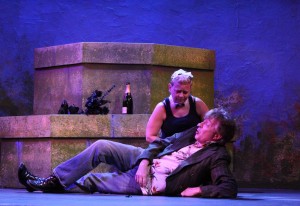 Maria). And the play actually operates on these two levels. While the Twelfth Night Baby Boomers are preoccupied with drinking, partying and obtaining the money to support their self-consumed lifestyles, the Twelfth Night Millennials pursue their quests for love, identity and authenticity.
Maria). And the play actually operates on these two levels. While the Twelfth Night Baby Boomers are preoccupied with drinking, partying and obtaining the money to support their self-consumed lifestyles, the Twelfth Night Millennials pursue their quests for love, identity and authenticity.
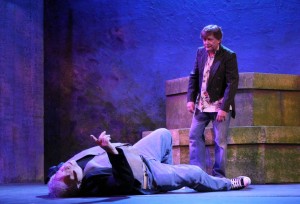 The metaphors are too good and too numerous to ignore. The drunken revelry of Sir Toby, Sir Andrew and Olivia’s lady in waiting play out not behind a gated residential but in the courtyard of Olivia’s mansion, where Sir Toby has camped out in the aftermath of his brother’s demise. Toby is the penultimate sycophant. He mooches off Olivia. He plays Sir Andrew for money, as well. And for
The metaphors are too good and too numerous to ignore. The drunken revelry of Sir Toby, Sir Andrew and Olivia’s lady in waiting play out not behind a gated residential but in the courtyard of Olivia’s mansion, where Sir Toby has camped out in the aftermath of his brother’s demise. Toby is the penultimate sycophant. He mooches off Olivia. He plays Sir Andrew for money, as well. And for 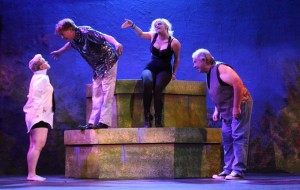 his part, when Andrew runs short of funds, he has to send for money. Is he on Social Security? Is he living off some kind of inheritance or royal pension? It’s hard to imagine either of these guys working for a living, never mind making any meaningful contribution to society. And for their part, the Twelfth Night Millennials either ignore or
his part, when Andrew runs short of funds, he has to send for money. Is he on Social Security? Is he living off some kind of inheritance or royal pension? It’s hard to imagine either of these guys working for a living, never mind making any meaningful contribution to society. And for their part, the Twelfth Night Millennials either ignore or 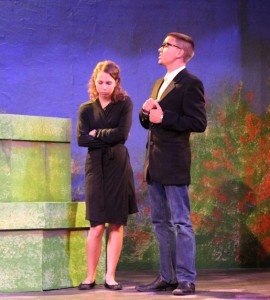 benignly tolerate their drunken elders, who prefer it that way as well.
benignly tolerate their drunken elders, who prefer it that way as well.
Shakespeare meant for Twelfth Night to serve as commentary on a number of matters important in Elizabethan England at the time – class and social ambition, gender identity and orientation, love and lust, and lies and deceit. Director Nykkie Rizley sagely shifts the emphasis away from class and social ambition, focusing more on gender identity, authenticity, love and cyber-bullying, issues that possess far more relevancy today for 16-29-year-olds and our culture at large. As a 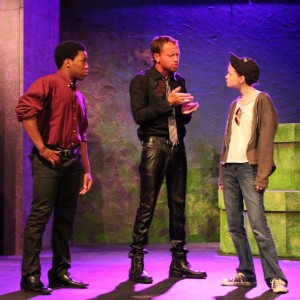 result, Olivia comes across not as a rich noblewoman consumed with propriety and her newfound station in life, but as an innocent young girl who has suddenly been freed to discover her sexuality and express her latent carnal desires for the very first time. Similarly, her counterpart, the Duke, is less inclined to think about affairs of state than affairs of the heart … or at least the idea of being in love. And the rest of the Twelfth Night Millennials? They’re busy trying to figure out who in the hell they are, especially when it comes to
result, Olivia comes across not as a rich noblewoman consumed with propriety and her newfound station in life, but as an innocent young girl who has suddenly been freed to discover her sexuality and express her latent carnal desires for the very first time. Similarly, her counterpart, the Duke, is less inclined to think about affairs of state than affairs of the heart … or at least the idea of being in love. And the rest of the Twelfth Night Millennials? They’re busy trying to figure out who in the hell they are, especially when it comes to 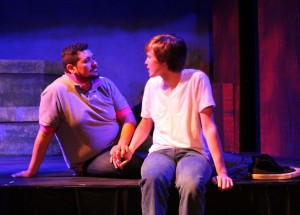 sexual orientation and gender identity.
sexual orientation and gender identity.
In the latter respect, Rizley is to be commended for her brave choices in casting. Many other modern productions of Twelfth Night are careful to ensure that stage kissing scenes are shared only by actors of the opposite biological sex. Not here. Sebastian kisses Antonio, often and by no means chastely, and although she thinks Cesario is a boy, the 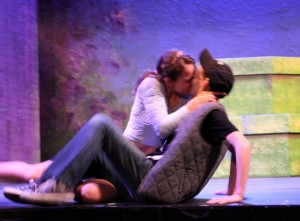 audience knows that when Olivia kisses and mauls Cesario, she is actually bussing and frolicking with a girl. But it’s not enough to include same sex kissing and touching. Rizley gets in the audience’s face by staging these scenes on edge of the stage where those in the first few rows can actually feel the heat.
audience knows that when Olivia kisses and mauls Cesario, she is actually bussing and frolicking with a girl. But it’s not enough to include same sex kissing and touching. Rizley gets in the audience’s face by staging these scenes on edge of the stage where those in the first few rows can actually feel the heat.
“In the direction that I took the show, I definitely 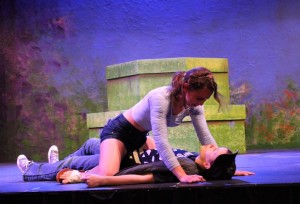 pushed some boundaries.” Rizley acknowledges. But that’s an earmark of the Millennial generation, which is not loathe to explore gender, racial, class and other demographic boundaries either in their overarching pursuit of authenticity. And in Twelfth Night, the characters who achieve that authenticity are the ones who find true love and happiness at the comedy’s conclusion (although I’m not
pushed some boundaries.” Rizley acknowledges. But that’s an earmark of the Millennial generation, which is not loathe to explore gender, racial, class and other demographic boundaries either in their overarching pursuit of authenticity. And in Twelfth Night, the characters who achieve that authenticity are the ones who find true love and happiness at the comedy’s conclusion (although I’m not 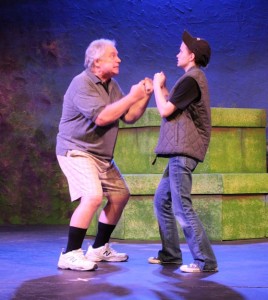 convinced that Millennials would agree that marriage is necessarily part of that equation).
convinced that Millennials would agree that marriage is necessarily part of that equation).
The Twelfth Night Boomers and Twelfth Night Millennials only intersect on a couple of occasions in this play, and none reflect positively on the oldsters. In one, the knighted-though-far-from-chivalrous Sir Andrew tries to eliminate competition for Olivia’s affections by pulling rank and challenging Cesario to a duel. (You can come up with your own similes for this one.) In another, Maria and Sirs Andrew and Toby send a text to the pompous and pedantic Malvolio telling him to come 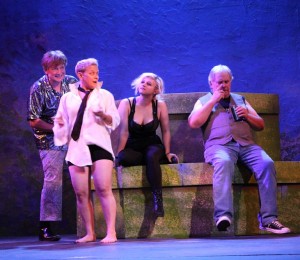 to the courtyard shirtless and shoeless, wearing only yellow pants, white cuffs and a bow tie. Believing the text to have come from the object of his desire, the lovelorn Malvolio rushes to Olivia’s side only to be humiliated, ridiculed and ultimately enchained half naked in a cold, dark chamber, where the trio take turns tormenting him. And what did Malvolio do to warrant such treatment. He had the temerity to object to the trio’s frivolity and spoil their freeloading good
to the courtyard shirtless and shoeless, wearing only yellow pants, white cuffs and a bow tie. Believing the text to have come from the object of his desire, the lovelorn Malvolio rushes to Olivia’s side only to be humiliated, ridiculed and ultimately enchained half naked in a cold, dark chamber, where the trio take turns tormenting him. And what did Malvolio do to warrant such treatment. He had the temerity to object to the trio’s frivolity and spoil their freeloading good  time. (More metaphors abound.)
time. (More metaphors abound.)
The injection of modern technology into a production of Shakespeare is by no means novel. It’s done with a fair degree of regularity in both British and American productions. But here, the use of a text to lead someone on is particularly germane. Cyber bullies and predators are phenomena of the internet, social media and other 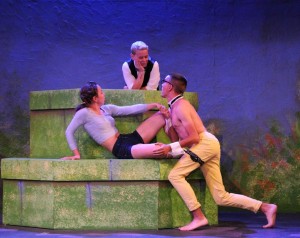 technology. “If you’re on the receiving end, it’s so easy to be fooled, so that aspect of the play was really important to me,” notes Rizley. “The trick destroyed [Malvolio]. It absolutely destroyed him. I don’t think Malvolio will ever be okay again.” Nor will many of the victims of cyber bullying and, of course, some have resorted to suicide to put an end to the torment they experienced.
technology. “If you’re on the receiving end, it’s so easy to be fooled, so that aspect of the play was really important to me,” notes Rizley. “The trick destroyed [Malvolio]. It absolutely destroyed him. I don’t think Malvolio will ever be okay again.” Nor will many of the victims of cyber bullying and, of course, some have resorted to suicide to put an end to the torment they experienced.
To be fair, I am neither a Shakespeare scholar nor  student, and I did not ask Nykkie Rizley whether the generational divide is intentional or more a function of the clear chemistry that exists among the younger members of this very talented cast. It matters not. The play can be enjoyed on this level or a number of other planes. There’s a lot to enjoy and much to appreciate in this modern production of Shakespeare’s Twelfth Night, and that themes such as these play out in Olde English only serves to heighten the humor and ramp up the bodacious laughs that the Bard has so generously lavished into the dialogue of this play.
student, and I did not ask Nykkie Rizley whether the generational divide is intentional or more a function of the clear chemistry that exists among the younger members of this very talented cast. It matters not. The play can be enjoyed on this level or a number of other planes. There’s a lot to enjoy and much to appreciate in this modern production of Shakespeare’s Twelfth Night, and that themes such as these play out in Olde English only serves to heighten the humor and ramp up the bodacious laughs that the Bard has so generously lavished into the dialogue of this play.
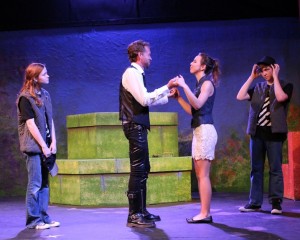 This is not your momma or your pappa’s Shakespeare. This is Shakespeare for and by Millennials and everyone else who enjoys two plus hours of rib-splitting laughs.
This is not your momma or your pappa’s Shakespeare. This is Shakespeare for and by Millennials and everyone else who enjoys two plus hours of rib-splitting laughs.
Related Articles.
- ‘Twelfth Night’ play dates, times and ticket information
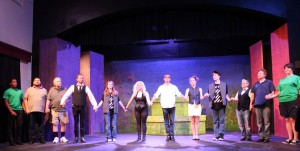 Lab Theater’s production of ‘Twelfth Night’ observes 400th anniversary of Shakespeare’s death
Lab Theater’s production of ‘Twelfth Night’ observes 400th anniversary of Shakespeare’s death- ‘Twelfth Night’ director Nykkie Rizley says play is ‘all Cumfuddled’
- Spotlight on Holly Hagan (Olivia)
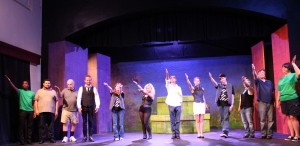 Spotlight on John Repa (Sir Toby Belch)
Spotlight on John Repa (Sir Toby Belch)- Spotlight on Dr. Ken Bryant (Sir Andrew Aguecheek)














 Tom Hall is both an amateur artist and aspiring novelist who writes art quest thrillers. He is in the final stages of completing his debut novel titled "Art Detective," a story that fictionalizes the discovery of the fabled billion-dollar Impressionist collection of Parisian art dealer Josse Bernheim-Jeune, thought by many to have perished during World War II when the collection's hiding place, Castle de Rastignac in southern France, was destroyed by the Wehrmacht in reprisal for attacks made by members of the Resistance operating in the area. A former tax attorney, Tom holds a bachelor's degree as well as both a juris doctorate and masters of laws in taxation from the University of Florida. Tom lives in Estero, Florida with his fiancee, Connie, and their four cats.
Tom Hall is both an amateur artist and aspiring novelist who writes art quest thrillers. He is in the final stages of completing his debut novel titled "Art Detective," a story that fictionalizes the discovery of the fabled billion-dollar Impressionist collection of Parisian art dealer Josse Bernheim-Jeune, thought by many to have perished during World War II when the collection's hiding place, Castle de Rastignac in southern France, was destroyed by the Wehrmacht in reprisal for attacks made by members of the Resistance operating in the area. A former tax attorney, Tom holds a bachelor's degree as well as both a juris doctorate and masters of laws in taxation from the University of Florida. Tom lives in Estero, Florida with his fiancee, Connie, and their four cats.